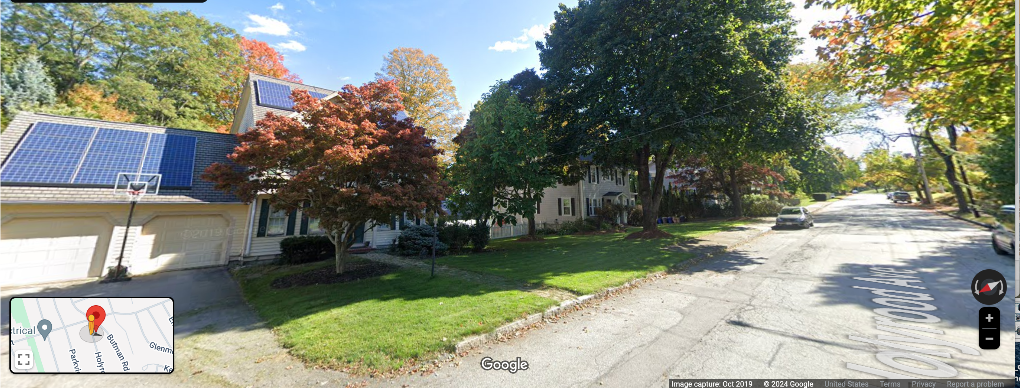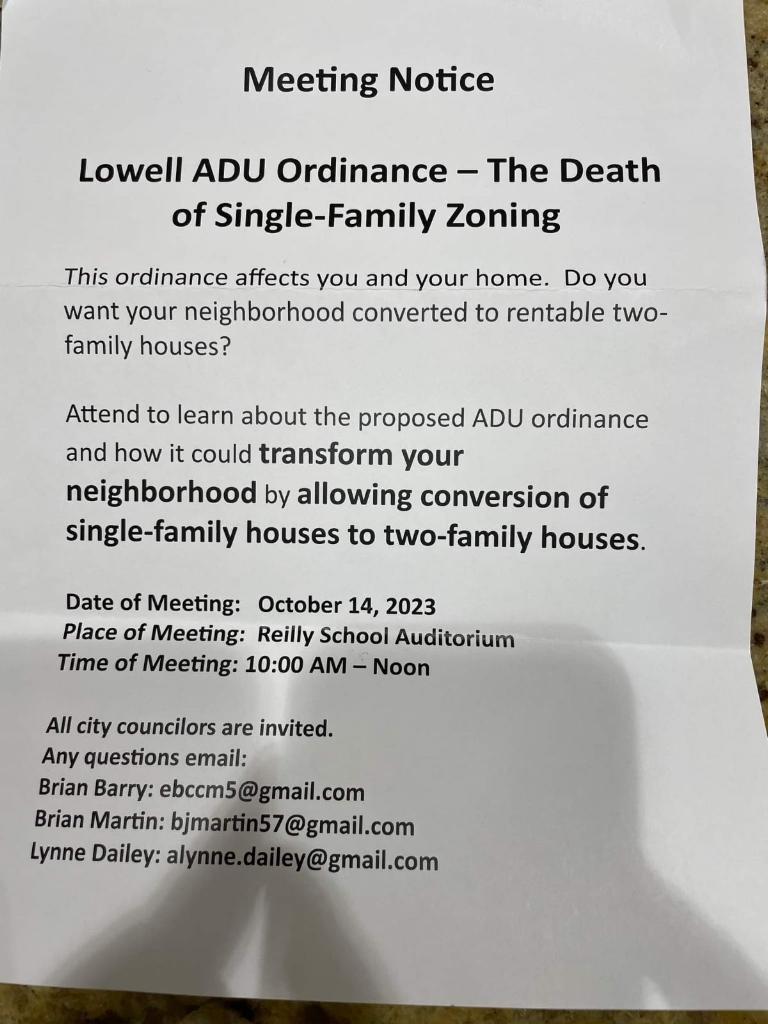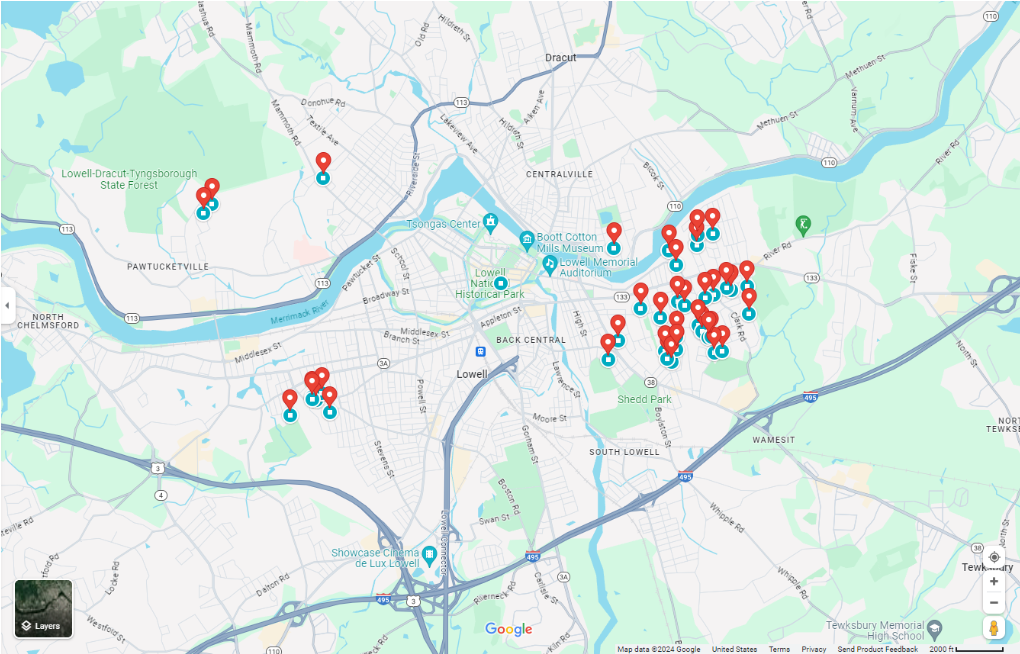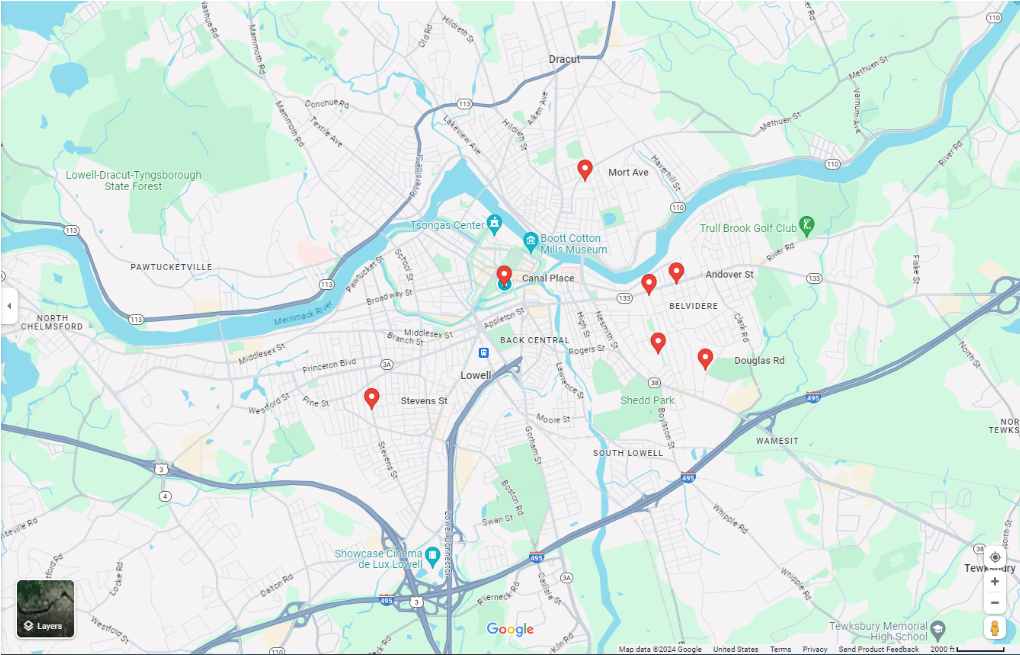Lowell Was Headed for ADUs, Then Single-Family Property Owners Spoke Up
| . Posted in News - 3 Comments
By Eric Weld, MassLandlords, Inc.
Until recently, the city of Lowell had been on track to enact an ordinance that would allow accessory dwelling units (ADUs) as of right citywide. The Lowell City Council had worked for more than a year to hammer out the ordinance. The ordinance had become more restrictive with the addition of several amendments. As a vote on the ordinance approached, in October 2023, seven out of 11 city council members supported it.

Residents of Belvidere, a historic and spacious section of Lowell, were most organized and vocal in killing a citywide ADU ordinance at the last minute. https://maps.app.goo.gl/RX3NKZAaZkSrV54L9 Image: cc by-sa googlemaps.
Then a small group of residents got involved, mostly from one well-to-do section of the city. Their pressure on city council members was enough to stop the proposal dead in its tracks. A vote was scheduled at the city council’s Oct. 17 meeting. The city’s mayor (who presides over city council) and two council members changed their minds and opposed the ADU ordinance. It was defeated by a 7–4 vote.
In one way, the Lowell ADU story is an illustration of democracy at work. City council members listened to (some of) their constituents and balanced their opinions into their legislative votes.
In another way, this incident points out some ways in which democracy can be harnessed and molded to support the stances of a vocal and influential, but relatively small, group of citizens.

“The Death of Single-Family Zoning,” screams the headline of a promotional leaflet distributed among residents to attend a public meeting to halt passage of a citywide ADU ordinance. Image: public domain
Citizens’ Public Meeting or High Pressure Anti-ADU Crucible?
A public meeting, organized by Lowell citizens on October 14, appears to be the turning point in the city’s ADU trajectory. Until very recently before that date, a majority of city council members continued to support the ADU ordinance. Even after the city’s planning board detailed its recommendations against passing the ordinance, seven council members continued to support it.
To drum up attendance at the meeting, a leaflet was distributed heavily among single family-zoned neighborhoods. It’s unclear who organized the public meeting. Names on the leaflet are Brian Barry, Brian Martin, and Lynne Daily.
The leaflet’s language was incendiary and hyperbolic, with a headline warning of “The Death of Single-Family Zoning” if the Lowell ordinance passed. “Do you want your neighborhood converted to rentable, two-family houses?”
The October 14 residents’ meeting was held at the Peter W. Reilly Elementary School, located on Douglas Road in the city’s Belvidere neighborhood. Belvidere is a historic section of town known for its stately homes. The session was attended by hundreds of residents opposed to ADUs, as well as a smattering of residents in favor.
Presumably, all council members were invited but we have not verified that. Three who did not attend supported the ADU ordinance. It’s possible, and conceivable, that they intentionally stayed away, recognizing the obvious anti-ADU bias of the promotional flier.

All the places that wrote to the Lowell city council to say "no" to ADUs. Fair Use of https://maps.google.com/ "saved" places feature.
The Well-to-do Well-Represented
Many attendees of the Oct. 14 meeting, and others, publicly submitted their vote recommendations to city council members via the “Contact the City Council” form. We obtained their recommendations via a public records request. An address map of submissions shows how the one Belvidere meeting likely skewed City Council perception. The contact form was overwhelmed with posts by Belvidere residents referring to that meeting, as well as a cluster from Pawtucketville, another historic section of town. A few wrote in from other districts.
The heavy majority of comments urge city councilors to vote against the ADU ordinance. Some mention the danger of overloading infrastructure. Schools, health and other public facilities would be overwhelmed, they fear. Traffic and on-street parking would increase, posing safety concerns in residential neighborhoods. A few peg their opposition to their claim that an ADU ordinance will not solve the housing shortage, but will bring harm to the city.
Many of the comments mention compromises to “neighborhood character” and property values. Some of the most vociferous comments seemed to be responding to the provocative language in the flier, warning councilors of a takeover by developers in cherished residential neighborhoods.
Online listings of meeting attendees who recommended against the ADU ordinance reveal a heavy concentration of white collar, affluent occupations. A CEO, two company presidents, an engineer, a consultant and several managers opposed passage of the law.
Among the half dozen who supported ADUs: a student, a pastor, a climate communications coordinator. Supporters’ comments remind councilors of the city’s and state’s housing shortage, especially the need for affordable housing that ADUs could help alleviate. Most supporters acknowledge that an ADU ordinance is not a single panacea to the city’s housing crunch, but rather a small assistive step among others.

All the places that wrote to the Lowell city council to say "yes" to ADUs. Fair Use of https://maps.google.com/ "saved" places feature.
Reasons for ADU Flip?
The city council was scheduled to vote on the ordinance as part of its October 17 public meeting. By the time of the meeting, three council members – Mayor Sokhary Chau, John Leahy and Vesna Nuon – pulled their support for the ordinance and voted it down.
Mayor Chau cited state legislation recently proposed by Governor Healey, including ADU provisions, as a reason for his change of stance. The governor’s housing bond bill, which she calls the Affordable Homes Act, was proposed in October. It includes a policy change that would allow ADUs as of right statewide, as well as numerous other policies.
Councilor Leahy was up front about his reason for pulling his support of the ADU ordinance. After hearing from his constituents, in the city’s Belvidere section, in opposition to the ordinance, he changed his mind on supporting it, he told The Lowell Sun following the vote.
Lowell Limits on ADUs
The Lowell ADU ordinance proposal was not unlike similar laws passed in recent years in Beverly, Salem, Medford (all of which now allow ADUs as of right), and many other nearby municipalities. Single family exclusive zoning remains intact. In fact, all these ADU ordinances, like the one in Lowell, require that any home with an ADU must maintain its single-family character. Local ordinances assist in that regard by limiting square footage of ADUs, requiring off-street parking, and for some, only allow ADUs for owner-occupied properties.
The fears of the Lowell ADU opposers have not come to be in other cities that have passed ADU ordinances. In fact, the small wave of ADU-by-right ordinances being passed across the state are resulting in relatively few new builds. Concord, for example, which passed an ADU-by-right ordinance in 2020, has permitted 13 ADUs since then. And anyway, the Lowell ordinance had several amendments added to it that would have severely restricted new builds. One amendment would have allowed no more than five new ADU permits in a single district in any given year.
Governor Healey’s administration projects as many as 8,000 new ADU builds statewide if this portion of her Affordable Homes Act is made law. (Massachusetts will need 200,000 new homes by 2030 to meet demand, according to the Citizens Housing and Planning Association.)
“Allowing for ADUs in Lowell can help us add desperately needed rental housing to address our affordability crisis,” noted Lowell City Councilor John Drinkwater in an op-ed for insidelowell.com. “More than half of Lowell residents are renters, and of those, more than half are rent-burdened…Contributing to this cost burden is the fact that Lowell consistently falls short of the amount of new housing production needed to meet demand. ADUs will not solve this problem, but allowing them is an incremental change that can modestly add housing units over time, without disrupting neighborhood character.”
Still in Need of Affordable Housing
Lowell, a city of more than 110,000 residents, is more densely populated than some of its neighbors, with 8,490 people per square mile in 2020. Slightly smaller Lawrence (12,861) is much more dense. Chelmsford (1,626), about a third the size of Lowell, is much less dense.
Aside from density, Lowell, like almost every other Massachusetts community, is sorely in need of increased housing options, especially the affordable variety. Its city council had worked for nearly 18 months on an ADU ordinance that would have added an option for affordable housing. Given its many restrictive amendments, the ordinance likely would have provided only a tiny housing boost.
Still, through misinformation and scare tactics, a small group of citizens halted even that modest proposal. The opposition was vocal, organized and (judging from some of the wealthy sounding titles of those who oppose) well-funded. No such organized effort came forth representing people in need of affordable housing.
If Governor Healey’s Affordable Homes Act – or even just its ADU proposals – make it into law, the Lowell issue may become moot as communities across the state will be mandated to allow ADUs as of right.
But Lowell’s opposition is a clear warning to the legislature that the Affordable Homes Act is far from a consensus proposal. Until rental housing providers – and in particular, Certified Massachusetts LandlordsTM – are elevated in prominence in Massachusetts, and until we can all be assured that landlords can promptly evict bad renters, people will continue to fear the rental housing next door and say anything to keep it away.




